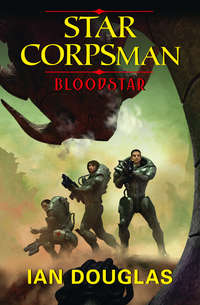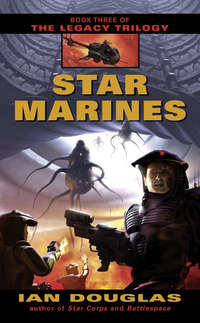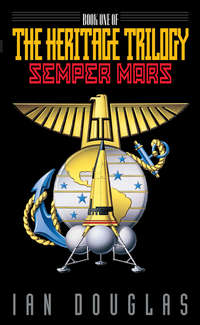
Полная версия
Deep Space
“Twenty minutes.”
Gray checked his inner clock. Nine hundred, then. Barely time to download the latest intel feeds. “I’ll be there, Admiral.”
There was a lot to go through. Nano reconnaissance probes returning from the 70 Ophiuchi star system suggested that the Turusch and Nungiirtok were preparing for something, bringing in more forces from elsewhere. Probes from 36 Ophiuchi seemed to show the Slan working on consolidating their conquest. More ships were arriving in-system, big ships. Likely they were digging in, preparing for a possibly human counterattack … but it was also possible that they were preparing a new assault of their own, one aimed, quite probably, at Earth.
And there was more. Signals Intelligence satellites in the Kuiper Belt had picked up the whisper of high-velocity microprobes churning through the fabric of space on outbound vectors, and the likeliest explanation was that Sh’daar clients were already scouting the solar system in preparation for an attack.
Gray was put rather forcibly in mind of the situation President Koenig—then Admiral Koenig, commander of CBG-18, had faced twenty years ago. Convinced that the only way to stop the expected Sh’daar assault on the Sol System was to take the war into Sh’daar space, Koenig had arranged to miss expected Confederation Naval Command orders to stay in Solar space by leaving before they arrived. Later, he’d fought a French squadron sent to bring the “rogue” battlegroup in.
The decision, as it turned out, had been the right one. A renewed Sh’daar assault on Earth had not materialized, and Koenig had gone on to discover their spacetime and force a truce. Biographers had pointed out, however, that had he been wrong Koenig would have been reviled as the man who’d abandoned Earth to the Sh’daar forces.
The Confederation might well want the battlegroup to stick close to the Sol System, just in case the Sh’daar struck out from Ophiuchus.
It was time. Gray alerted his personal AI that he was not to be disturbed, then opened a channel through to Admiral Steiger. The Admiral’s AI routed the connection to Geneva, and Gray found himself in a virtual conference.
The European Unionists tended to be conservative in their virtual backgrounds. The venue was a large conference room, with two walls and the ceiling set as windows, the other two walls showing gently shifting abstracts of pastel light. Twelve men and women were seated around the conference table—it had the appearance of mahogany—half in EU military uniforms, the others in civilian dress. Through the windows, Gray could see the labyrinth of the Plaza of Light outside, a hundred stories down … and beyond it, the glitter of late-afternoon sunlight on Lake Geneva.
“Admiral Steiger,” a bearded EU admiral named Longuet said. “Captain Gray. Thank you for linking in. We need to discuss a change to your upcoming mission.”
“We feel that a deployment to Omega Centauri is not … critical at this time,” one of the civilians added. Her name was Ilse Roettgen, and she was the president of the Confederation Senate.
“Indeed, ma’am?” Steiger said. “Our operational plan has been set for some weeks, now. In light of the new reconnaissance information from Omega Centauri, it seems to me that the mission is, if anything, more critical than ever.”
“Not in light of the information from 36 Ophiuchi,” Admiral Longuet said.
“We are in the process of assembling a strike force,” another civilian said. Gilberto Lupi was the Brazilian imperial minister of Defense. “We intend to take back 36 Ophiuchi, before the enemy entrenches himself, before he becomes too strong for us to oust him.”
“I see,” Steiger said. “And I take it you’ve consulted with my government on this?”
“There is no need,” Longuet replied. “We are invoking Military First Right.”
Gray felt an inner jolt at that, a kind of psychic shock. Military First Right? After almost three centuries, it was possible that the Pax Confeoderata was about to fail.
And when it did, the USNA Star Navy would be smack at the heart of the storm.
First Right had not been invoked before, not since it had been passed by the Confederation Senate twelve years earlier. The law was assumed to be unenforceable in America. It looked like that assumption was about to be tested.
The Confederation had arisen from the ashes of the Second Sino-Western War, a sharp and brutal conflict fought in the first half of the twenty-second century. The Battle of Wormwood and the subsequent fall of a small asteroid into the Atlantic Ocean had seriously weakened the old United States politically, forcing the union, first, of several North American nations into the USNA, followed by the merging of the USNA with the newly founded Earth Confederation. Under the original terms of the amalgamation, each member state kept control of its own military—especially its spaceborne forces. For a state’s military to be put under the direct control of the Geneva government required, literally, an act of that state’s congress … in the case of the USNA by a two-thirds’ majority vote in both the Senate and the House.
But in 2412, Geneva had passed the Military First Right Act over two dissenting votes, Great Britain and the USNA. The star navies of Earth’s Confederation were the property, the military arm, and the responsibility of the Earth Confederation, not of any lone member state. North America, of course, and Great Britain had disagreed. For the two of them, ancient allies, the Earth Confederation had always been a loose alignment of independent nation-states, a planetary government more in name than in fact.
That this belief put the USNA at odds with every other Confederation member state save one seemed to have mattered little. Not until the Sh’daar Ultimatum in 2367 had there been a serious need for a united Earth military … and even then, the union had been an awkward and incomplete cooperation rather than a single-fleet command. Military First Right had been intended to change that … and, obviously, to prevent a repeat of the so-called Koenig’s Mutiny, which had led to his defeat of a combined French-British fleet at HD157950 in 2405.
That Koenig’s decision had been right was immaterial. He’d decided to face the Sh’daar forces in their own space, rather than assuming a purely defensive posture within Earth’s solar system, but, in so doing, left Earth open to a possible attack … an attack that, thank God, had never materialized. Geneva had acted to prevent such a situation from ever happening again—or, at least, so they’d planned it. That the Military First Right Act might backfire on them and lead to a civil war and the collapse of the Confederation seemed never to have entered their minds.
“This,” Longuet said, indicating another Confederation officer at the virtual table, “is Admiral Christian Delattre. He and his squadron are en route now to join the America battlegroup at Synchorbit. He will be assuming command of the battlegroup, at which point he will transfer his flag to the America, which shall become his flagship. Admiral Steiger, you will remain in command of the USNA battlegroup, but you will take your orders directly from Admiral Delattre. Is this understood?”
“I will need confirming orders from Columbus, sir,” Steiger said.
“No, Admiral, you will not,” Mykhaylo Serheyev said. Gray had to check a mental sidebar to see who the man was—the prime minister of the Ukrainian Union. “The Act of Military First Right is specific on this point. There was a final vote on this in Geneva just this morning, one that passed with a comfortable majority. Carrier Battlegroup Eighteen is now under direct Confederation control.”
“Nevertheless,” Steiger said, “it is my duty as a USNA officer to confirm these orders through my own government.”
“Of course, feel free to consult with your government,” Roettgen said. “But you are now working for us.”
“And if you resist, gentlemen,” Longuet added, “you will be replaced by officers who see political reason, by Confederation officers without your, ah, conflict of interest.”
And with a jolt, Gray was back in his office, alone with the monitors and virtual screens at his workstation. He and Steiger, it seemed, had just been summarily dismissed.
Not good, he thought. Not good at all …
Executive Office, USNA
Columbus, District of Columbia
United States of North America
1215 hours, EST
“Ms. Valcourt would like a moment for consultation, Mr. President,” his secretarial AI told him. “She says it is most urgent.”
Koenig looked up from a report displayed on his desktop—the Confederation robotic freighter Dione was landing at Giordano Bruno Base on the moon with an unusually large shipment of supplies—and sighed. He’d been expecting this. “Very well. Link me in.”
Julie Valcourt, a Canadian, was Speaker of the North American House, and one of Koenig’s more powerful opponents in the government. A member of the Global Union party, she was an outspoken advocate for the Global Union platform—that the USNA must fully integrate into the Confederation government.
“Good afternoon, Mr. President,” she said. “I haven’t yet had the opportunity to congratulate you on your victory.”
“Thank you, Madam Speaker,” Koenig replied. He knew, however, that congratulations were not the primary thought on Valcourt’s mind. The woman never did anything without a frank political motive behind it. “That’s very kind of you.”
“Not at all. The people, as they say, have spoken.”
“Well, some of them have.”
The news downloads were calling Koenig’s election victory a landslide and a popular mandate, but Koenig knew better. The population of North America currently stood at nearly three quarters of a billion people. Of those, perhaps half had bothered to link in and vote, and the only reason that the Freedom party had won was the stark fact that the Global Unionists and the Progressives hadn’t been able to agree on a common anti-Freedomist platform. The Progressives, like Koenig’s own Freedomists, wanted to extend the franchise to AIs; the Unionists feared the loss of human sovereignty and the possibility of second-class status for organic citizens somewhere down the line. But the Progressives felt that the military needed to be run by the Confederation, which of course was where they parted company with the Freedomists.
As a result the Progressives and the Unionists had knocked each other out of the running … but Koenig remained painfully aware that he’d been re-elected with just 44 percent of the vote. Despite the fireworks displays and enthusiastic mobs in the concourse, less than a quarter of North America’s population had actually voted for him.
“I thought,” Valcourt continued, “that you should know that the Europeans are going to be trouble.”
“Tell me something I don’t know.”
“They approached me yesterday with a question.”
“Yes?”
“Is the USNA population going to accept a Confederation take-over of our military?”
“Military First Right,” Koenig said, nodding. “I know.”
“You know?”
“I was informed a few hours ago. Geneva has assumed command of one of our carrier battlegroups.”
“I … didn’t think they would move this quickly. Have you agreed to this?”
“Apparently, it doesn’t matter whether we agree or not. The battlegroup commander was simply told how it would be. We need to decide how we’re going to respond, however. We could refuse …”
“Civil war? A complete break with the Confederation?”
“It could come to that.” He thought for a moment. “Tell me, Madam Speaker, how did they approach you? In person?”
“No. It was a direct e-link.”
“Did you record it?”
“Apparently, Mr. President, the link was one-view specific.”
“Ah.”
E-links allowed data to be downloaded directly into the hardware nanotechnically grown within most people’s brains. Neural connections allowed what amounted to telepathy, mind-to-mind, as well as the downloading of information from the Global Net, direct interfaces with AIs or with machines—anything from a spacecraft to a door. And anything that was downloaded, from a conversation to an encyclopedia reference, could be stored … usually. Private messages could be embedded with code that erased the data as it was being transferred to memory. The recipient retained his or her organic memory of the message—though this was often fuzzy and indistinct, like the fast-evaporating memory of a dream—but there was nothing on record, nothing that could be uploaded to a database as, say, evidence for criminal proceedings.
“That message could be interpreted as an attempt by a foreign government to manipulate the election,” Koenig said.
“‘Foreign government’? Sir, this is the Confederation we’re talking about! Earth’s government!”
“The relationship of the USNA to the Confederation is still … let’s just say it’s still being tested. What I’m saying is that interfering with a nation’s choice of its own government violates the provisions of the Confederation Charter.”
“We’ve been part of the Confederation for three hundred years! We were one of the founding states of the Pax!”
“Yes, and the original constitution stated that each nation within the Pax was sovereign, that it would determine its own form of government and that it would retain control of its own military forces. This First Right thing is something new … an abridgement, an erosion of our rights under that charter.”
“Sometimes, rights must be surrendered for the good of the whole,” Valcourt said. “An individual doesn’t have the right to kill another person, where a national government can wage war and kill millions.”
Koenig gave a mental shrug. “I know we don’t agree on this, Madam Speaker. Just how did you reply to the question?”
“About how our citizens would respond to Geneva taking control of our military? I told them to take a look at the celebrations going on outside in the Freedom Concourse,” she said. “It would appear that the citizenry approves of less interference from Geneva, not more.”
“And their response?”
“They said that things change, situations change … and that the people can be led. That, after all, is the whole purpose of government.”
“I would say that government is supposed to express the will of the people, and to secure and protect that people’s rights. ‘Life, liberty, and the pursuit of happiness,’ remember?”
“I would suggest, Mr. President, that you are a few centuries out of date. Those words were destroyed when the Chinese dropped Wormwood into the Atlantic Ocean.”
Koenig sighed. Sometimes he did feel out of date. “Shall we agree to disagree, Madam Speaker? Once again?”
“My apologies, sir. I didn’t intend that to sound impertinent.”
“Not at all.” He hesitated. “I’m curious, though. What were these … Europeans, you say? What did they want from you? Why did they approach you?”
“I think they genuinely wanted to know how we Americans would react to the invoking of the Military Rights Act. They approached me because I am the Speaker of the House … which means, technically at least, that I speak for the American people.” Her image gave a wan smile. “After this past election, I doubt that that will be so for much longer.”
Koenig nodded. Valcourt represented an uneasy alliance within the House—Unionists, Progressives, and a half dozen smaller parties, including the Reclamationists, the New Order Socialists, and the Popular Neodemocrats—and as such she’d been the face and the voice of the loyal opposition throughout most of his first term as president.
The term loyal opposition had just taken on a new, stronger meaning for Koenig. Valcourt had come to him with the warning, rather than seeking political advantage for herself or her party through some kind of alliance with Geneva. He was impressed. He’d not known Julie Valcourt was capable of passing up a political opportunity.
“I don’t know about that, Madam Speaker,” he told her. “There’s nothing like a threat from outside to pull a people together, and let them know they’re all working for the same goal.”
“We’ll have to see about that, Mr. President. For now, though … I must ask you. What are you going to do about this … this power grab? Will you risk a civil war?”
“I don’t know, Madam Speaker. Like I said, I only heard about it a few hours ago.”
“A delicate situation, sir.”
“Delicate doesn’t tell the half of it. If I give in, I set a precedent, and it’ll be all but impossible to reverse it. If I refuse, even if we don’t end up in a civil war, Earth will end up divided and scattered, unable to agree on a common front against the Sh’daar.”
“‘Who speaks for Earth?’” Valcourt quoted.
“You mentioned the Europeans. Do you think there’s a faction within the Confederation? A split we could use?”
“I’m not sure. I think Brazil has sided with the EU. Russia may be undecided. Ukraine is with the Europeans. I think North India and the EAS are sitting on the fence, waiting to see how it all shakes out.”
“Pretty much business as usual,” Koenig said. “China and the Theocracy will be watching closely too, but I suspect they’ll be siding with us.”
Neither China nor the Islamist Theocracy were members of the Confederation … the gulfs left by several world wars continued to exclude them from a world government.
Which, of course, meant that the Confederation wasn’t truly a world government, did not, in fact, represent a united Earth.
“I’m terrified, Mr. President, that this is going to end in world war. Humankind may not survive. If it does, it will not be able to resist the Sh’daar when they finally come.”
“On that, Madam Speaker, you and I are in complete agreement,” Koenig told her. “I just wish I could see a third alternative …”
TC/USNA CVS America
USNA Naval Base
Quito Synchorbital
1315 hours, TFT
“Here they come, Captain,” Connie Fletcher told him. “They’re making the most of it, aren’t they?”
“You think that display is just to impress us?” Gray replied.
“Maybe they just want to impress themselves,” Admiral Steiger observed. “Kind of like team spirit, y’know?”
The Confederation flotilla was decelerating into synchronous orbit, inbound from Mars after a two-hour passage. Those warships, Gray knew, had been assembled from all across the Sol System, and several had arrived over the past few days from the nearer extrasolar colonies—Chiron, Hel, New Earth, Bifrost Orbital, Santo Iago, and Thoth.
In the van were four star carriers—the British Illustrious, the North Indian Kali, the European Union’s Klemens von Metternich, and the EAS Simon Bolivar—light carriers measuring from 600 to 850 meters from their mushroom caps to the ends of their drive stems.
In a loose swarm of vessels moving astern and on the flanks were fifty-one additional Confederation warships, from fleet gunboats and light bombardment vessels to Admiral Delattre’s flagship, the massive railgun cruiser Napoleon. With tightly controlled bursts from their plasma maneuvering thrusters, the Confederation fleet began edging toward the open gantries of the synchorbital military docking complex.
“Fifty-five warships,” Gray observed. “That’s a hell of a lot of team spirit. They outnumber us, that’s for sure.”
The America battlegroup currently numbered just twenty-four vessels, though eight more USNA warships were docked at the Quito Synchorbital, undergoing repairs or refits. The Confederation fleet was trying deliberately to overawe the North-American squadron, of that Gray was certain. He wondered if Steiger was going to roll over and play dead on this one. Steiger had commanded a number of vessels before his appointment as CO CBG-40, but it had been a long time since he’d seen combat. Word was he’d been a lieutenant commander in the CAG office on board America during Crown Arrow twenty years ago. He might be pretty rusty.
But then, it had been twenty years since Gray had seen combat, and he was rusty as well. The Sh’daar Truce had been two decades of quiet … no raids, no planetary assaults, and even potential human enemies—the Islamists and the Chinese Hegemony, for instance—had been keeping a non-confrontational profile.
Training sims helped maintain basic skills, but they were no substitute for the real thing.
The big question about Steiger was how aggressive he might be. Where Gray had been wearing a Starhawk at Alphekka and Omega Cent, Steiger had been driving a console in PriFly—not at all the same thing.
Gray frowned at the thought as soon as it arose and pushed it aside. Steiger was the CO, and that meant he required the loyalty and the full support of every officer in the battlegroup. His normally laid-back attitude didn’t mean he wasn’t a fighter; look at Koenig, the CO of CBG-18. The man certainly wasn’t a coward, not with something like twenty-five years in the service.
But would the man be able to stand up to what amounted to a naked Confederation power play?
Gray didn’t know. He wasn’t sure he would be able to refuse direct orders from Geneva, not when doing so might well result in civil war.
What he did know was that the parade of Confederation warships sidling up to the docking gantries out there was nothing less than a cold-blooded threat.
Chapter Six
10 November 2424
Intermundi
Civilian Sector Green 7,
Quito Synchorbital
1915 hours, TFT
Lieutenant Donald Gregory leaned back in his seat, taking another deep inhale of firedust from the golden sphere in his left hand. The nanometer-sized particles were absorbed directly through his sinus cavities and into his bloodstream, triggering a release of dopamine in his brain and a sharp, rippling wave of pleasure surging through his body. He gasped, then went rigid for a moment as the wave peaked, then ebbed. “Oh, yeah …”
His right hand was clasped tight around the bare waist of Lieutenant Jodi Vaughn, who giggled as he started to come down from the hit. “Good stuff, huh?”
“Babe, right now I’m flying! Wrapped up in metaspace and ’cubing at max!”
They were in the Intermundi, a club located just outside the synchorbital naval base catering mostly to military personnel. Gregory had had the duty tonight, but Teddy Nichols had been willing to swap with him, allowing him to keep his date with Jodi. Located within a huge, rotating wheel, the club featured numerous small rooms heavily draped and cushioned, providing privacy and comfort, and with hidden arrays of netlink connections to cater to every pleasure need.
Firesmoke was not addictive … not physically, at least, though Gregory had heard of pilots who’d developed emotional dependencies and needed partial memory wipes to shake them. Smoke worked through cerebral implants, which meant you could fine-tune the effect and clear the neural pathways afterward. The registered forms, served in joints like the Intermundi, were completely legal, though shipboard regulation frowned on using the stuff. They came down hard on you if you let it knock you off the duty roster.
But it felt good … BETS, as the slang put it, Better Than Sex. And you could hit it again and again and …
“You want some more?” he asked her.
She accepted the sphere, held the sweet spot up to her face, and breathed in, her eyes closed. Firesmoke actually consisted of artificially manufactured receptor-key molecules tucked away inside C64 buckyballs … carbon spheres so tiny they formed a nearly invisible mist. They were absorbed straight through the mucus lining of the sinus cavities, hitched a ride on blood vessels leading into the brain, and then unfolded inside the pleasure centers for a quick, hard jolt of pure ecstasy.











